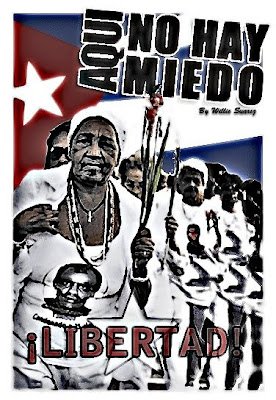Freedom's Martyr: Orlando Zapata Tamayo
Today, February 23, is a day of mourning for those who cherish freedom. We remember a state crime—the death, 15 years ago, of Orlando Zapata a Cuban activist and political prisoner who spent more than two months on a hunger strike and was denied water for 18 days after being brutally beaten. His executioners were Raúl Castro and Filiberto Hernández Ruiz, the head of Kilo 8 Prison in Camagüey.
Zapata was doubly murdered, for after his death the Cuban regime launched a racist campaign to destroy his reputation, even enlisting the complicity of presidents such as Brazil’s Luiz Inácio Lula da Silva to divert attention from the tortures inflicted upon the activist.
Orlando Zapata killed no one, did not assault a military barracks, nor did he plot assassination or a violent overthrow of the Cuban government. He was imprisoned for exercising his fundamental human rights. He was an activist who believed in the Varela Project, which sought to gather signatures to promote constitutional reform in the Cuban parliament, and he envisioned a Cuba where fundamental freedoms were respected and the people could freely choose their political system.
His death in prison confirms the criminal nature of the Cuban regime—a regime capable of repressing, imprisoning, beating, and murdering in order to silence the voices of democratic change from the Cuban people.
It is important to remember that the state crime against Zapata was not an isolated incident but the beginning of a wave of deaths of at least five human rights activists between February 2010 and July 2012:
• On May 8, 2011, Juan Wilfredo Soto died as a consequence of a brutal beating administered by members of the PNR.
• On October 14, 2011, Laura Pollán, founder of the Ladies in White, died.
• On January 20, 2012, Wilmar Villar Mendoza died after a hunger strike in prison as a protest against his unjust imprisonment.
• On July 22, 2012, opponents Oswaldo Payá Sardiñas and Harold Cepero died in an alleged “traffic accident” near Bayamo.
Murdering pro-democracy activists is the same tactic used by dictatorships such as the Venezuelan regime, which has killed more than 24 protesters/activists and human rights defenders since 2014, including the young Venezuelan soldier Rafael Acosta Arévalo, who, like Orlando Zapata, was subjected to brutal torture. It is the same brutality employed by dictators like Vladimir Putin in Russia following the state crime against Alexei Navalny, and by Alexander Lukashenko in Belarus against activist and political prisoner Igor Lednik.
A TRIBUTE TO REINA LUISA TAMAYO
Sometimes injustice forces the good, the worthy, and the noble—people who under other circumstances would have continued their anonymous lives—to step into the public light and, overnight, become the protagonists of change. There are many examples of this both in Cuba and around the world, but I want to place special emphasis on the crusade of Reina Luisa Tamayo Danger—Zapata's mother in the months and years following his death—as she embodies the Cuban fighter, the woman with a will of steel, and the one with a firm voice demanding rights, proving to be as brave as she is noble and sincere.
I want to recall something essential: it was circumstances of extreme injustice, crime, and impunity imposed by the Castro regime itself that made Reina Luisa rise from anonymity to become, in just a few months after Zapata’s death in one of the most outspoken opponents of Castroism throughout Cuba. The trigger in her life was her maternal instinct to save Orlando Zapata, and after he was assassinated, she fought tirelessly so that her son's name and the crime committed against him would be known in all four corners of the globe.
Ironically, it was the cruelty of the Castro regime itself that drove this dignified Cuban mother and grandmother, 61 years old from Banes, to leave the confines of her home—abandoning her daily care for her animals, her work washing clothes on the street, and selling rice and sugar at her neighborhood store—to become one of the leading figures of the Ladies in White, to take up the leadership of a national and international crusade in homage to her son's memory and to the freedom of Cuba. From housewife and grandmother, a hardworking woman transformed into a political opponent. All in response to the arbitrariness, the crime, and the impunity of the Castro regime.
The jailers—those who live in the shadow of crime, those who order crimes and torture, those who hate and destroy, those who oppress—picked the wrong side entirely when they crossed the Zapata family. They chose wrongly and earned as an enemy a dignified woman who has vowed never to stop fighting, even unto death. With her firm voice and the resolve of Mariana Grajales, she has called the Castros "murderers and cowards" to their face. The regime has gone to extreme lengths against her; after all, they understand the qualities of their opponent. They have used all the force of evil and repression against this woman—beating her, pushing her, dragging her, suffocating her with gasoline, subjecting her to charged racist insults—but nothing has been enough to stop this soul, imbued with an energy and an indestructible strength that comes solely from morality and reason.
As she once declared before a hostile mob, "I, Reina Luisa Tamayo Danger, mother of the prisoner of conscience Orlando Zapata Tamayo, say before God and my blessed Changó that the Castro brothers will not and cannot be forgiven."
ZAPATA LIVES!

